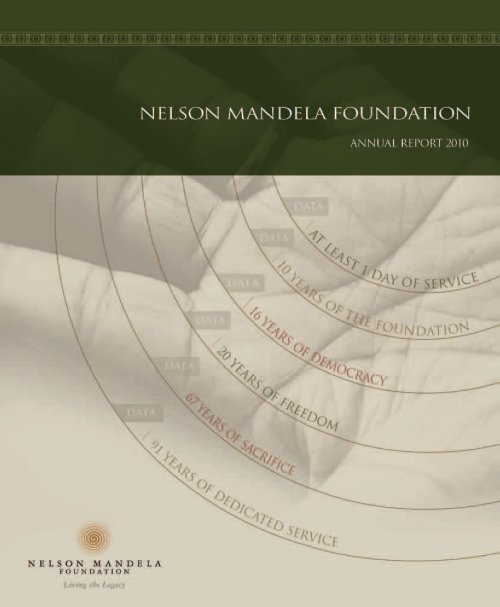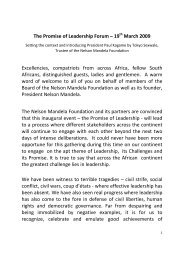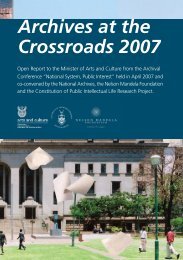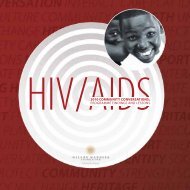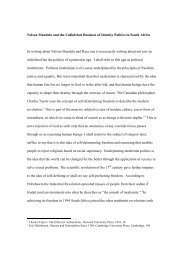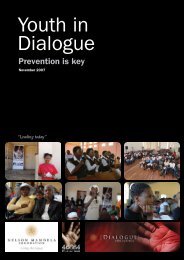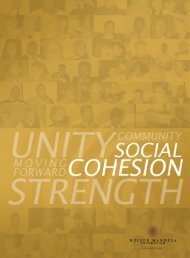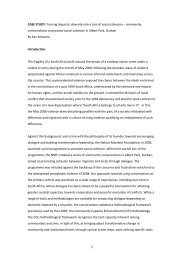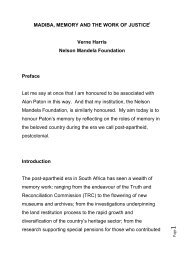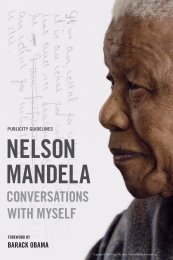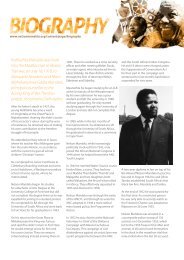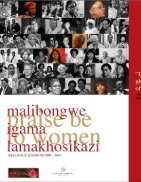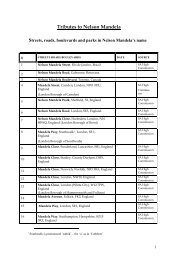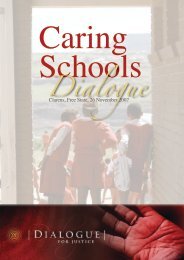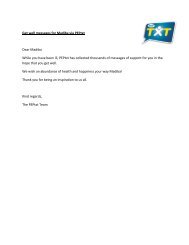Annual Report 2010 (4.1MB) - Nelson Mandela Foundation
Annual Report 2010 (4.1MB) - Nelson Mandela Foundation
Annual Report 2010 (4.1MB) - Nelson Mandela Foundation
You also want an ePaper? Increase the reach of your titles
YUMPU automatically turns print PDFs into web optimized ePapers that Google loves.
CONTENTSA Tribute to our FounderMessage from the ChairpersonChief Executive’s ReviewThe Year at a Glance2346Programme <strong>Report</strong>: MemoryProgramme <strong>Report</strong>: Dialogue<strong>Mandela</strong> Day <strong>Report</strong>Publications9152123Resource MobilisationTrustees of the <strong>Nelson</strong> <strong>Mandela</strong> <strong>Foundation</strong>Staff of the <strong>Nelson</strong> <strong>Mandela</strong> <strong>Foundation</strong>Summarised Consolidated Financial StatementsDonors of the <strong>Nelson</strong> <strong>Mandela</strong> <strong>Foundation</strong>2731343944Annexure A: Website <strong>Report</strong><strong>Nelson</strong> <strong>Mandela</strong> CharitiesHow to Support the Work of the <strong>Foundation</strong>464849
A Tribute to Our Foundernumber, “46664”; the <strong>Foundation</strong> also became aplatform to fund and implement a range of other socialupliftment projects.It became apparent though that his humanitarian legacyresonated far beyond his own country. South Africaremained a priority, but by the time he finally retired in2004, his example of lifelong devotion to the causes offreedom, justice and social equality was being utilised allover the world. In 2008, at the 46664 London concertto celebrate his 90 th birthday, he called on the nextgeneration of leaders and, indeed, on people everywhere,to take up his work, which he said remained unfinished:“It is time for new hands to lift the burdens. It is in yourhands now.”The <strong>Nelson</strong> <strong>Mandela</strong> <strong>Foundation</strong> wasestablished in 1999 to promote the values andvision of <strong>Nelson</strong> <strong>Mandela</strong> in order to contributeto the making of a just and fair society.Initially, this entailed direct intervention in criticalsocial issues such as health and education. Mr <strong>Mandela</strong>personally facilitated partnerships with governments,individuals and the private sector, to name but a few,to build schools in rural areas; he launched a massiveHIV/AIDS campaign under the aegis of his prisonThis call necessitated a change in direction for the<strong>Foundation</strong>, away from funding and implementingprojects, to becoming a catalyst for change. This isnow the guiding principle behind the <strong>Foundation</strong>’score focus – the Centre of Memory and Dialogue. TheCentre’s programmes today provide opportunities forindividuals, civil society, government and the privatesector to participate in promoting our Founder’s legacy.As will be seen by the programme detail elsewhere in thislandmark <strong>Annual</strong> <strong>Report</strong>, the <strong>Foundation</strong> now strivesto give expression to our Founder’s legacy by makinghis life and times available to the world; by facilitatingmeaningful dialogue; and by promoting the emergenceof a sustainable, global movement of good through the“<strong>Mandela</strong> Day” campaign as adopted by the UnitedNations General Assembly.The <strong>Foundation</strong> decided, in its 10 th year of existence,to pay tribute to our Founder, Mr <strong>Mandela</strong>, who hasspent so many years championing the causes of freedomand justice, and in seeking redress for those sufferingfrom political and social injustice. This is our messageto our Founder: enjoy your retirement! The <strong>Foundation</strong>,alongside our sister organisations (the <strong>Nelson</strong> <strong>Mandela</strong>Children’s Fund and the <strong>Mandela</strong> Rhodes <strong>Foundation</strong>)will carry on your work with befitting integrity, dedicationand energy.2 NELSON MANDELA FOUNDATION ANNUAL REPORT <strong>2010</strong>
MESSAGE FROM PROFESSORGJ GERWEL, CHAIRPERSON OFTHE BOARD OF TRUSTEESThe year under review was the third of the five-yearstrategic realignment that the <strong>Nelson</strong> <strong>Mandela</strong><strong>Foundation</strong> embarked on in 2007. It also marked10 years since the <strong>Foundation</strong> was established in 1999. Itis appropriate to briefly recall here the key goal of thatrealignment: to move from being a broad-based grantmaker and programme implementer to one focusing onsocial justice through “memory and dialogue”. Structurally,this meant locating the <strong>Nelson</strong> <strong>Mandela</strong> Centre ofMemory and Dialogue at the organisation’s core.This way we can continue promoting our Founder’shumanitarian legacy, alongside our sister organisations, the<strong>Nelson</strong> <strong>Mandela</strong> Children’s Fund and the <strong>Mandela</strong> Rhodes<strong>Foundation</strong>, without duplicating the work of governmentand many others in civil society.The 2009/10 financial year can be characterised as a yearof continuity. We have continued to build on the work donein the preceding two years. The research, archiving andcommunications functions within the Memory Programmecontinued to become more professional. The Programmehas become a sought-after resource, and provided archivaland research services to a broad range of scholars, authorsand film-makers, as well as the general public. Similarly,the Dialogue Programme continued to pioneer newapproaches to dialogue, particularly at community level. Itis significant that many communities took the initiative toorganise their own “conversations” as a follow up to thoseinitiated by the <strong>Foundation</strong>. Even “taboo” subjects suchas xenophobia and HIV/AIDS were explored, facilitatedby individuals in their midst who had been trained in theUnited Nations Development Programme’s methodology.The flagship <strong>Nelson</strong> <strong>Mandela</strong> <strong>Annual</strong> Lecture, presented byProfessor Muhammad Yunus, Nobel laureate andGrameen Bank Founder, once more brought globalfocus to some of the issues addressed locally through the<strong>Foundation</strong>’s community dialogue initiative. ProfessorYunus’s insights into addressing poverty through investmentin women continues to resonate within South Africa, as itdoes elsewhere in the world.In terms of our governance, significant progress was madeas well. Our revised Trust Deed, now reflective of our newstrategic approach,was registered. Wewelcomed onto the Boardof Trustees Ms FuthiMtoba and Mr KgalemaMotlanthe. Both bringsignificant strengths thatwill help us as we chartour future course. Iwould like to thank all myfellow Trustees for theirdedication, theirwisdom and clarityof thinking.The year wasn’t withoutits challenges. The globaleconomic downturnsaw donations to our Sustainability Fund decline markedly,reflective of the global trend in respect to organisationssuch as ours. As said before in previous reports, it is vital forthe <strong>Foundation</strong> to attain financial sustainability so that itcan continue, well into the future, to promote its Founder’slegacy as an independent organisation able to address eventhe most contentious social issues. We would therefore liketo thank, most sincerely, those donors who continued tosupport us, even in these economically difficult times. Tothe management and staff, a word of thanks for all the hardwork and perseverance.Finally, it was gratifying to note that we were able to helpin some measure – as Madiba, our Founder, puts it – “tomake his retirement a reality”. The launch of the <strong>Mandela</strong>Day campaign in July 2009 saw the emergence of a globalnetwork of organisations and individuals doing good in<strong>Nelson</strong> <strong>Mandela</strong>’s name. The <strong>Foundation</strong> has called on theworld to make every day a <strong>Mandela</strong> Day with the intentionof stimulating a continuous, world-wide “movement forgood”. This call was given a huge boost when, later in theyear, the United Nations General Assembly unanimouslyadopted July 18 as <strong>Nelson</strong> <strong>Mandela</strong> International Day. Nowthere is an opportunity for people everywhere to address theworld’s ills using Mr <strong>Mandela</strong>’s legacy rather than seekingthe intervention of the person; thus his legacy will flourish.NELSON MANDELA FOUNDATION ANNUAL REPORT <strong>2010</strong> 3
REVIEW BY MR AE DANGOR,CHIEF EXECUTIVE OFTHE FOUNDATIONProgramme continued to assemble elements of the vast,scattered record of our Founder’s legacy. This includedauditing and capturing Rivonia Trial records in a databasethat is now accessible through the <strong>Foundation</strong>’s website andcompleting phase two of the <strong>Mandela</strong> Prison Files project– all Mr <strong>Mandela</strong>’s prison correspondence has been copiedand summarised in accordance with author, recipientand date.We believe that access to these historic records is bestfacilitated through their location within a varietyof institutions rather than centralised ownership.Underpinning this strategy is the ongoing development ofthe <strong>Foundation</strong>’s website as an archival portal. Online useof the Centre’s databases grew to an average of 34 000users per month.Nevertheless, the Centre’s permanent physical collectionalso grew substantially. Important awards, gifts, oral anddocumentary records and film footage were received,inter alia, from the African National Congress, the familyof Anthony Sampson, Peter Magubane and the BBC.Richard Stengel and Ahmed Kathrada bequeathed 70hours of interviews they conducted with Mr <strong>Mandela</strong>during the writing of Long Walk to Freedom.In his message, our Chairperson characterised theyear under review as one of “continuity”. Indeed,we succeeded in maintaining our focus on the keystrategic goals set out in the <strong>Foundation</strong>’s five-yearplan, approved by the Board of Trustees in February2007. Our core programmes, Memory and Dialogue,met important targets for the year. These are detailedin the respective programme reports. This review willattempt to summarise progress made toward the overallorganisational goals (2007-2012) and the key challengesthat lie ahead.The MEMORY Programme made steady progresstowards the overarching goal of establishing and makingavailable to the world a world-class archival resource onthe life and times of <strong>Nelson</strong> <strong>Mandela</strong>. During 2009/10 theThe <strong>Foundation</strong>’s exhibitions remained popular and highlyeffective outreach tools. A major travelling exhibition,<strong>Mandela</strong>, a major retrospective on Mr <strong>Mandela</strong>’s life andtimes, initially launched in 2008 at the Apartheid Museum(Gauteng), was also installed at the Mthata Museum(Eastern Cape), the Malmo Museum (Sweden) and theIziko Slave Lodge (Cape Town). An award-winning<strong>Mandela</strong> Day exhibition was installed in New York, inpartnership with the 46664 campaign.The Memory Programme’s advocacy role furtherincreased. Partnering with civil society organisations, wehosted a number of forums, and engaged with governmentofficials and Parliament to ensure that memory andarchival work remain an important element of thediscourse in a country in transition, such as South Africa.Preserving and facilitating public access to the records of4 NELSON MANDELA FOUNDATION ANNUAL REPORT <strong>2010</strong>
THE YEAR AT A GLANCE• The inaugural <strong>Mandela</strong> Day campaign saw aglobal network of government and non-governmentorganisations, as well as individuals, doing communitywork in <strong>Nelson</strong> <strong>Mandela</strong>’s name. The United NationsGeneral Assembly formally adopted <strong>Nelson</strong> <strong>Mandela</strong>International Day as an official commemorative day,giving further impetus to the emerging global movementfor good.• The Rivonia Trial records were audited andcaptured in a database that is now accessible throughthe <strong>Foundation</strong>’s website.• Phase two of the <strong>Mandela</strong> Prison Files project wascompleted – all Mr <strong>Mandela</strong>’s prison correspondencehas been copied and summarised by author/recipientand date.• Online use of the Centre’s databases (portal) grewto an average of 34 000 users per month.• Important awards, gifts, oral and documentary recordsand film footage were received, inter alia, from theAfrican National Congress, the family of AnthonySampson, Peter Magubane and the BBC.Above and below: The <strong>Mandela</strong> Day campaign saw individualstrying to make a difference in their communities.• Richard Stengel and Ahmed Kathrada bequeathed 70hours of interviews they conducted with Mr <strong>Mandela</strong>during the writing of Long Walk to Freedom.• A travelling exhibition, <strong>Mandela</strong>, a majorretrospective on Mr <strong>Mandela</strong>’s life and times, initiallylaunched in 2008 at the Apartheid Museum, was alsoinstalled at the Mthata Museum (Eastern Cape),the Malmo Museum (Sweden) and the Iziko SlaveLodge (Cape Town). More than 150 000 peoplevisited the Apartheid Museum and viewedthe exhibition.• There are currently eight travelling exhibitions inSouth Africa and abroad.• An award-winning <strong>Mandela</strong> Day exhibition wasinstalled in New York, in partnership with the46664 campaign.6 NELSON MANDELA FOUNDATION ANNUAL REPORT <strong>2010</strong>
The <strong>Mandela</strong> Day exhibition in Grand CentralStation, New York.GR Naidoo exhibition at the <strong>Nelson</strong> <strong>Mandela</strong> <strong>Foundation</strong>.• A total of 110 HIV/AIDS “CommunityConversations” took place in 11 communities spreadover nine provinces.• Twenty-one community dialogues on socialcohesion with special focus on xenophobia took placein five “flashpoint” areas in the Eastern Cape, Gauteng,KwaZulu-Natal, Mpumalanga and the Western Cape.• More than 1 000 people attended the seventh <strong>Nelson</strong><strong>Mandela</strong> <strong>Annual</strong> Lecture, which was also broadcastlive by the South African Broadcasting Corporation.Addressed by Nobel laureate and Grameen BankFounder Professor Muhammad Yunus, the lecture(themed “Investing in the Marginalised”) amplifiedunderlying issues of poverty and inequality addressed inthe community conversations programme.• The final Malibongwe Dialogue, titled “Canwe Create a World Without Poverty?” took place.Participants examined the pivotal role women play – pastand present – in overcoming poverty.• Six publications, including three books, werereleased. One publication, Hunger for Freedom: TheStory of Food in the Life of <strong>Nelson</strong> <strong>Mandela</strong>, was givena prestigious Special Jury Prize at the World CookbookAwards in Paris.Professor Muhammad Yunus speaks at the 2009<strong>Annual</strong> Lecture.• Programme funding for the Centre of Memory andDialogue was secured to cover activity for the fullfinancial year (see the Resource Mobilisation section forthe full list of donors).• The global economic downturn affected the<strong>Foundation</strong>’s fundraising efforts, but the SustainabilityFund grew from R112.5-million in 2008/09 to R123.1-million in 2009/10.NELSON MANDELA FOUNDATION ANNUAL REPORT <strong>2010</strong> 7
MEMORY PROGRAMME• Hosting the inaugural meeting of the AfricanAssociation of Communication Directors.• Contributing to the revival of the South AfricanSociety of Archivists.• Meeting with the Director General of the NationalDepartment of Arts and Culture to promote thepreservation of, and public access to the recordsof political prisoners and the Truth andReconciliation Commission.• Partnering with the South African History Archive tomake written and oral presentation to Parliament on thenew Protection of Personal Information Bill.• Meeting with the Deputy Minister of Justice topromote access to records related to Mr <strong>Mandela</strong> andto the Truth and Reconciliation Commission.• Convening a forum, in partnership with the SouthAfrican History Archive, titled “Reconciliation and theWork of Memory in Post-apartheid South Africa”.• Convening, in partnership with the South AfricanHuman Rights Commission, a dialogue on xenophobiawith media representatives, the South African PoliceService and the Johannesburg Metro.• Hosting, in partnership with the Goethe Instituteand including representatives from both thegovernments of South Africa and Kenya, a workshopon truth commissions in the contexts of South Africaand Kenya.• Hosting the launch of Alf Kumalo’s autobiography,where a panel discussion took place on Kumalo’s workin the broader context of documenting the antiapartheidstruggle.• Hosting a reunion of surviving Rivonia Trialists(Mr <strong>Mandela</strong>, Andrew Mlangeni, Ahmed Kathradaand Denis Goldberg) and comrades to view a play onthe Trial and to discuss it with the playwright,Monde Wani.Surviving Rivonia Trialists at the Rivonia Trial play.• In addition, Programme staff contributed toprofessional publications and delivered papers atnumerous professional gatherings. They spoke or taughtin South Africa, Canada, India and Italy.The Virtual ArchiveUnlike most conventional archives, the <strong>Nelson</strong> <strong>Mandela</strong>Centre of Memory and Dialogue is not defined by thecustody of physical collections, although it has substantialand growing collections. The <strong>Mandela</strong> Archive is infinite,fragmented and scattered, both geographically andinstitutionally. It is not the Centre’s intention to bringall these materials into a single physical collection. Theimperative is to document this vast resource, facilitateaccess to it, and promote its preservation and use.The most important tool in achieving this objective isweb-based technology. The Centre has conceptualised amulti-layered virtual archive (portal), accessible throughthe <strong>Foundation</strong>’s website (www.nelsonmandela.org). Thefollowing key design elements define the portal’s shape:databases providing dense description of materials;linkages to actual materials, to other sites and to differentlayers within the site; and digitised materials, from hardcopy to moving images. At the beginning of the reportperiod, a review of the portal and an implementationplan for its enhancement was adopted by the Board. Thefollowing achievements in realising this plan during thereport period should be noted:• Each of the portal’s design elements received sustainedattention, content was web-enabled and tested, and the10 NELSON MANDELA FOUNDATION ANNUAL REPORT <strong>2010</strong>
DIALOGUE PROGRAMMEIn <strong>2010</strong> an evaluation of the work to date will beundertaken. In addition to making a “numerical”assessment (such as the number of people whoparticipated), an attempt will be made, throughstorytelling, to measure the broader impacton communities.Participants in one of the community conversations.• On average, 11 follow-up conversations took place ineach community.• In some cases the follow-ups were organised locallywithout the involvement of the <strong>Foundation</strong>, furtherevidence that community participants were takingownership of the process.This last point is key to the <strong>Foundation</strong>’s strategy to ensurethe sustainability of the community conversation process,and of widening its impact. The <strong>Foundation</strong> is, however,mindful of the resource and structural constraints facedby many communities and that they will continue to needexternal partnerships.The Programme therefore continued to engage variousNGOs, government and private-sector organisationsthrough consultative forums. We presented lessons learntfrom the ground and have gained insights on how tostrengthen the current implementation model. As a resultof our interactions, some of these organisations, such asthe Tshepang Trust, have trained their own facilitators inthe methodology being piloted by the <strong>Foundation</strong>. OtherNGOs have also requested training for their facilitators.However, to ensure that the locus of ownership remainswith affected communities, future capacity buildingprogrammes will focus on individuals residing withinthese communities.The Future – <strong>2010</strong> OnwardsThe <strong>Nelson</strong> <strong>Mandela</strong> <strong>Foundation</strong>’s communityconversations programme will continue to act as acatalyst, supporting community level capacity buildingand facilitating partnerships between communitiesand entities such as the South African National AIDSCouncil and the South African Council of Churches. Theobjective is to stimulate a network of institutions that arewilling and able to utilise existing capacity in support ofcommunity efforts to understand and respond to verycomplex challenges presented by HIV/AIDS.Social Cohesion Community ConversationsIn 2009, the <strong>Foundation</strong>’s Dialogue Programme initiatedconversations in five communities in South Africa thatwere affected by the xenophobic violence in 2008.This was done to assist in the creation of platforms fordiscussion and mediation and to promote peaceful coexistence.The Programme continues to expand its work topromote social cohesion in communities through dialogueby focusing on issues such as human rights, and peaceand reconciliation. It does this with the support of otherinstitutions, government and NGOs. The dialogues tookplace in the following areas:• Atteridgeville – Gauteng• Khayelitsha and Nyanga – Western Cape• Cato Manor and Albert Park – KwaZulu-Natal• Delmas and Nkomazi – Mpumalanga• Jeffrey’s Bay, Warmer, New Brighton and Kunya –Eastern CapeTwenty-one community conversations were successfullycompleted during this reporting period in areas where16 NELSON MANDELA FOUNDATION ANNUAL REPORT <strong>2010</strong>
DIALOGUE PROGRAMMEthe hyper-endemic pillar of the aids2031 initiative. Thisis a global effort to stimulate longer-term planning for theglobal AIDS response. While the emergency response isstill needed, greater attention has to be paid to makingthe response more systemic and integrating planninginto ongoing state, non-government and internationalorganisation policy and practice. The Southern Africanpillar’s core mandate was to facilitate regional discussionson these two issues. The <strong>Foundation</strong>’s DialogueProgramme hosted the pillar’s secretariat.The Promise of Leadership dialogue.evident at the conclusion of this dialogue series that thiskind of interaction needs to take place within communitiesin order to create greater awareness of existingopportunities and to stimulate a ground-swell of voicescapable of influencing state and private sector policies.Various NGOs have indicated interest in continuing thiswork with women in communities.Promise of Leadership DialogueThe Promise of Leadership (POL) dialogue, convened inpartnership with the African Leadership Initiative, focusedon the leadership challenges Africa faces in initiating andimplementing sustainable economic development, creatingwealth aimed at overcoming inequality and eradicatingpoverty. Rwandan President Paul Kagame delivered thekeynote address titled “From Conflict to Reconstruction:Development in Rwanda”.This set the scene for intensive, solution-oriented discussionamong leading figures from academia, business, civilsociety and government from across Africa. POL involveda number of young people in order to empower futureleaders. Discussions have ensued about the possibility ofother organisations replicating POL elsewhere in Africa.AIDS2031Emanating from consultations during the 2008 DurbanAIDS Conference, the <strong>Nelson</strong> <strong>Mandela</strong> <strong>Foundation</strong> andthe Joaquim Chissano <strong>Foundation</strong> were asked to co-chairFollowing a number of regional consultations, and utilisingexisting research and data, the pillar compiled an initialsynthesis paper called Turning Off the Tap – LookingForward to 2031.Two supporting papers titled Future Leadership in HIV/AIDS and HIV/AIDS Financing and Resource Capacitiesin the Future will be finalised in the first quarter of <strong>2010</strong>.The latter of the two papers is intended to define the typeof financing and resource capacities required in the futureto address the question, “What should be done to turn offthe tap?”The overall report will be completed in <strong>2010</strong> andpresented at the final regional consultation. It is intendedthat the ongoing policy and advocacy work will be handedover by the two co-chairing <strong>Foundation</strong>s to a moreappropriate regional mechanism, such as the Championsformed by former Southern African DevelopmentCommunity heads of state.ConclusionThe Dialogue Programme met its primary goal during theyear, namely to play a catalytic role by maintaining theDialogue momentum, piloting and seeding initiatives thatothers can take ownership of – at community level, amongother non-government organisations and, indeed, withinstate institutions. A platform has now been created throughthe <strong>Mandela</strong> Day campaign that will allow the <strong>Foundation</strong>to intensify this process, locally and internationally, so thatMr <strong>Mandela</strong>’s legacy can be used to improve people’s liveswithout requiring the direct intervention of one man orone organisation.18 NELSON MANDELA FOUNDATION ANNUAL REPORT <strong>2010</strong>
MANDELA DAYREPORT & Publications
MANDELA DAY REPORTThe <strong>Nelson</strong> <strong>Mandela</strong> <strong>Foundation</strong> and the Vodacom<strong>Foundation</strong> marked their 10-year anniversaries and theinaugural <strong>Mandela</strong> Day in 2009 by awarding gifts to two<strong>Mandela</strong> Day initiatives:• Kaya FM was recognised for enthusiastically promotingthe day on air every day for more than a week and foridentifying and highlighting community initiatives thatpractised “<strong>Mandela</strong> Day every day”.Buti Manamela hands the <strong>Mandela</strong> Day Gift of GivingCertificate to Kaya FM’s Greg Maloka; Bob Collymore,Chief Officer of Corporate Affairs, Vodacom, looks on.the Slovoville community outside Roodepoort, as wellas in Dobsonville, Soweto.• In South Africa’s cities of Port Elizabeth, George,Mthatha and East London, supermarket chain Shopritehosted four <strong>Mandela</strong> Day parties for senior citizens.• The Soroptimist Club of Tshwane delivered foodhampers to Potter’s House, a centre for abused anddestitute women.South African government departments and radio stationsalso participated enthusiastically and gave of their time.Some 300 Department of Health practitioners organisedX-rays and other medical services for people in Mqanduli(Eastern Cape); the Limpopo Housing MEC organisedthe construction of 67 houses for destitute families and theVaal Triangle’s 90.6FM Stereo radio station arranged foreight choirs to perform for the elderly around the region.• The City of Matlosana (North West Province) wasrecognised for its comprehensive <strong>Mandela</strong> Day initiative,which included highlighting the plight of the physicallydisabled, cleaning disability centres in and around thecity, and providing lunch to some of its citizens.With Mr <strong>Mandela</strong>’s birthday having been accordedinternational status, it remains for every individual aroundthe world to take up the personal challenge issued by theman himself and show how each one of us can make adifference, not only on July 18, but every day.The <strong>Nelson</strong> <strong>Mandela</strong> <strong>Foundation</strong> and its sister charitieswould like to thank the South African government, theUnited Nations General Assembly, civil society, corporatesand all individuals who participated in making theinaugural <strong>Mandela</strong> Day a success.Political parties also rose to the challenge, with AfricanNational Congress (ANC) and ANC Youth Leaguemembers conducting a clean-up campaign at theNhlazatshe taxi rank and visiting the Gugulethu Old AgeHome in the Western Cape.The Department of International Relations andCooperation ensured that the message reached globalaudiences by spreading it through South Africa’s foreignmissions. These efforts led to governments and civil societyorganisations adopting <strong>Mandela</strong> Day.Buti Manamela hands the <strong>Mandela</strong> Day Gift of GivingCertificate to officials from the City of Matlosana. Fromleft: Bunga Ntsangane, Ernest Ngalo, Rose Thabanchu.22 NELSON MANDELA FOUNDATION ANNUAL REPORT <strong>2010</strong>
PUBLICATIONSThe Centre of Memory and Dialogue worked on a rangeof publications during the report period.<strong>Nelson</strong> <strong>Mandela</strong>: The Authorised Comic Book(First published in South Africa with Jonathan BallPublishers in 2008)Versions of this publication were published in France, theUnited States and the Netherlands. Considerable work wasdone conceptualising and finding partners for an animatedversion of the book for TV broadcast.Hunger for Freedom: The Story of Food in the Life of<strong>Nelson</strong> <strong>Mandela</strong>(Published with Jacana in 2008)This publication was given a Special Jury Prize at theWorld Cookbook Awards in Paris.NELSON MANDELA FOUNDATION ANNUAL REPORT <strong>2010</strong> 23
Malibongwe Igama Lamakhosikazi/Praise be to Women:Dialogue Session 2007 - 2009The <strong>Foundation</strong> released a book celebrating the threeMalibongwe dialogues that the <strong>Foundation</strong> convened overthe past three years.Truth, Reconciliation and Transparency in South Africaand Kenya: Lessons LearnedThe <strong>Foundation</strong> published this booklet in partnership withthe Goethe Institute.The Promise of LeadershipThe <strong>Foundation</strong> launched a coffee-table book detailingthe events that occurred at the first Promise of Leadershipdialogue, held in March 2009. This seven-chapter worklooks at Africa’s recent successes, while highlighting thechallenges that continue to face Africa and the potentialramifications if leadership fails to deliver. The bookcontains more than 20 contributions from respectedthought leaders around the world, dealing with topics suchas social entrepreneurship, gender issues, youth leadership,peace and reconciliation, environmental challenges,and the role of the media and society in addressing thechallenges the continent faces.24 NELSON MANDELA FOUNDATION ANNUAL REPORT <strong>2010</strong>
Long Walk to Freedom(Published with Macmillan in 2009. Published in allSouth Africa’s official languages).Research and proofreading support was provided to thechildren’s version.<strong>Nelson</strong> <strong>Mandela</strong>: The Authorised Portrait(Published with PQ Publishers in 2009, 2nd edition)Research and proofreading support was provided.Community Conversations: Communities Embracing EachOther – 2009This booklet details the outcomes of the 15 dialoguesthe <strong>Foundation</strong> convened in various communities acrossSouth Africa to date. It explains the methodology behindthe conversations, the reasoning behind the initiative, the<strong>Foundation</strong>’s goals, the areas the <strong>Foundation</strong>’s communityconversations team visited, the challenges each of thosecommunities face and how they are finding ways toaddress them.A Prisoner in the Garden: Opening <strong>Nelson</strong> <strong>Mandela</strong>’sPrison Archive(Published with Penguin South Africa in 2005)This publication continues to sell well internationally andis now almost out of print.Considerable work was done on the following books,all due for publication in <strong>2010</strong>: <strong>Nelson</strong> <strong>Mandela</strong>:Conversations with Myself (PQ Publishers), the memoirs ofRica Hodgson (Pan Macmillan) and a book/memoir withXoliswa Ndoyiya (STE Publishers).NELSON MANDELA FOUNDATION ANNUAL REPORT <strong>2010</strong> 25
RESOURCEMOBILISATION
RESOURCE MOBILISATIONQuick Resource Mobilisation FactsIn respect of donations received within the 2009/10financial year, it is recorded that:• 56% of the <strong>Foundation</strong>’s overall support was attainedfrom bilateral agencies, including large contributions fromthe Belgian Embassy, DFID and GTZ;• 19% of the support was received from UN agencies,including contributions from UNESCO towards theMemory Programme, and United Nations Children’sFund (UNICEF) towards the Education Programme ofthe <strong>Foundation</strong>, now managed by our sister organisation,the <strong>Nelson</strong> <strong>Mandela</strong> Institute for Education and RuralDevelopment. Support was also received from UNAIDSfor the aids2031 initiative, detailed earlier in this report;• Local corporates continue to be supportive of the<strong>Foundation</strong>’s work, providing 10% of the overalldonations received within the financial year, includingcontributions from ABSA Bank, SAP Southern Africaand Vodacom; and• 15% of the donations received were recorded from amyriad of donors, including those who support thegeneral work of the <strong>Foundation</strong>.In this analysis, it is recorded that the <strong>Foundation</strong>’s multiyearpartnerships have contributed to the “receiptsrecorded” in a particular financial year: in essence, whilethe <strong>Foundation</strong> only received a certain level of supportin this financial year, grants recorded within the previousbook year contributed to “deferred grants” being recorded.This speaks to a specific strategy of the <strong>Foundation</strong>, tobring about multi-year partnerships that allow and facilitatelong-term planning.In respect of deferred, total grants received, it isrecorded that:• 40% of its contributions were received fromphilanthropic donors. These include the generouscontributions from the Friends of the <strong>Nelson</strong> <strong>Mandela</strong><strong>Foundation</strong> and others;• 24% of its grants were received from local andinternational corporates, including ABSA Bank,Coca-Cola, SAP Southern Africa and others;• 19% of its support was received from bilateral agencies,including the kind support of GTZ and DFID; and• 10% of its overall support was received from UNagencies, as explained in previous paragraphs.We are indebted to the donors who support, both uniquelyand in a continuous way, the work of the <strong>Nelson</strong><strong>Mandela</strong> <strong>Foundation</strong>. A full list of donors is listed onpage 44.28 NELSON MANDELA FOUNDATION ANNUAL REPORT <strong>2010</strong>
THE FOUNDER WITHTHE NELSON MANDELAFOUNDATION TEAMFirst row front (from left): Sam Madimetja, Sello Hatang, Kathy Ndebele, Kerileng Marumo, Mmamosa Magile,Florence Garishe.Second row (from left): Buyi Sishuba, Zintle Bambata, Tokyo Sexwale (Trustee), <strong>Nelson</strong> <strong>Mandela</strong>(Founder), Sahm Venter, Joe Ditabo, Colette Kelly, Vimla Naidoo.Third row (from left): Zanele Riba, Ethel Arends, Molly Loate, Thoko Mavuso, Denise Williams, Verne Harris, JackieMaggott, Lucia Raadschelders, Boniswa Nyati, Siviwe Khaba, Dudu Buthelezi, Peter Moitse, Achmat Dangor (CEO),Luthando Peter, Ruth Rensburg, Mothomang Diaho, Lee Davies, Lesley Nkosi, Chantal Cuddumbey, Yase Godlo, Zelda laGrange, Razia Saleh, David Sithole, Bushy Mphahlele and Heather Henriques.NELSON MANDELA FOUNDATION ANNUAL REPORT <strong>2010</strong> 29
TRUSTEES &STAFF
TRUSTEES OF THE NELSONMANDELA FOUNDATIONTrustees and CEO with the Founder of the <strong>Nelson</strong> <strong>Mandela</strong> <strong>Foundation</strong>. Back (from left): Professor Njabulo Ndebele;Futhi Mtoba, Achmat Dangor (CEO), Irene Menell, Ahmed Kathrada. Front (from left): Tokyo Sexwale, Dr MamphelaRamphele, <strong>Nelson</strong> <strong>Mandela</strong> (Founder) and Chris Liebenberg. Absent: Professor Jakes Gerwel and Kgalema Motlanthe.Professor Jakes GerwelJakes Gerwel is Chancellor of Rhodes University,Distinguished Professor in the Humanities at theUniversity of the Western Cape, and Honorary Professorin the Humanities at the University of Pretoria.He was Vice-Chancellor and Rector of the University ofthe Western Cape from 1987 to 1994. From May 1994 toJune 1999 he served as Director General in the office ofPresident <strong>Mandela</strong> and Secretary of the Cabinet in theGovernment of National Unity.He is presently a Non-Executive Director of Naspers.He is Non-Executive Chair of Aurecon, BrimstoneInvestment Corporation, Life Healthcare and Media24.He chairs the Boards of Trustees of the <strong>Nelson</strong> <strong>Mandela</strong><strong>Foundation</strong>, the <strong>Mandela</strong> Rhodes <strong>Foundation</strong>, the AllanGray Orbis <strong>Foundation</strong> and is Vice Chair of the PeaceParks <strong>Foundation</strong>.Mr Ahmed KathradaAhmed Kathrada is a veteran anti-apartheid activist whowas jailed for life on June 12, 1964 with <strong>Nelson</strong> <strong>Mandela</strong>,NELSON MANDELA FOUNDATION ANNUAL REPORT <strong>2010</strong> 31
STAFF OF THE NELSONMANDELA FOUNDATIONEthel ArendsRecords Management SpecialistDUDU ButheleziOffice AideAchmat DangorChief ExecutiveLee DaviesDatabase AdministratorMothomang DiahoHead: Dialogue ProgrammeJoe DitaboProperty AdministratorFlorence GarisheReceptionistYase GodloProject Coordinator:Dialogue ProgrammeVerne HarrisHead: Memory Programme34 NELSON MANDELA FOUNDATION ANNUAL REPORT <strong>2010</strong>
Sello HatangManager: Informationand CommunicationHeather HenriquesManager: Intellectual Propertyand GovernanceColette KellyManagement AccountantZelda LA GrangeHead: Founder’s OfficeMolly LoateDialogue Programme AdministratorSam MadimeTjaProperty AssistantJackie MaggottSupport Officer:Memory ProgrammeKerileng MarumoFinance AdministratorThoko MavusoLiaison Officer: CEO’s OfficeNELSON MANDELA FOUNDATION ANNUAL REPORT <strong>2010</strong> 35
Zanele RibaArchivistRazia SalehSenior ArchivistBuyi SishubaPA: Chief ExecutiveMaretha SlabbertPA: Founder’s OfficeSahm VenterSenior ResearcherNaomi WarrenProject Manager:Dialogue ProgrammeNELSON MANDELA FOUNDATION ANNUAL REPORT <strong>2010</strong> 37
<strong>Report</strong> of independentauditors To the trusteesof the <strong>Nelson</strong> <strong>Mandela</strong><strong>Foundation</strong> Trust GroupThe summarised consolidated financial statementscomprising of the consolidated statement of financialposition, consolidated statement of comprehensiveincome, consolidated statement of changes in funds andconsolidated cash flow statement of the <strong>Nelson</strong> <strong>Mandela</strong><strong>Foundation</strong> Trust Group, set out on pages 40 to 43, havebeen derived from the consolidated financial statements ofthe <strong>Nelson</strong> <strong>Mandela</strong> <strong>Foundation</strong> Group for the year ended28 February <strong>2010</strong>. The summarised consolidated financialstatements are the responsibility of the Trust’s Trustees. Ourresponsibility is to express an opinion on whether the summarisedconsolidated financial statements are consistent, inall material respects, with the consolidated financial statementsfrom which they were derived.We have audited the consolidated financial statements ofthe <strong>Nelson</strong> <strong>Mandela</strong> <strong>Foundation</strong> Trust Group for the yearended 28 February <strong>2010</strong>, from which the summarisedfinancial statements were derived, in accordance withInternational Standards on Auditing.In our opinion, the summarised consolidated financialstatements are consistent, in all material respects, withthe consolidated financial statements from which theywere derived.For a better understanding of the Trust’s financial position,its financial performance and cash flows for the year, andof the scope of our audit, the summarised consolidatedfinancial statements should be read in conjunction withthe consolidated financial statements from which thesummarised consolidated financial statements were derivedand our audit report thereon.PricewaterhouseCoopers Inc.Director: Nezira AyobRegistered AuditorPRETORIA24 August <strong>2010</strong>NELSON MANDELA FOUNDATION ANNUAL REPORT <strong>2010</strong> 39
Consolidated Statementof Comprehensive Income<strong>2010</strong>R2009R<strong>2010</strong>R2009RINCOME55 780 105107 158 31755 780 105107 158 317Grants received:Designated grantsOther donationsDividends receivedOther income55 700 74850 587 4545 113 2949 60069 757105 612 16745 778 24959 833 9181 129 127417 02355 700 74850 587 4545 113 2949 60069 757105 612 16745 778 24959 833 9181 129 127417 023EXPENDITURE(61 939 270)(52 134 204)(61 644 245)(51 839 178)Operating expensesProject expenses17 559 90344 379 36713 746 64338 387 56117 264 87744 379 36713 451 61738 387 561Net (deficit)/surplus beforefinance income(6 159 165)55 024 113(5 864 140)55 319 139Finance incomeTotal finance income9 451 31111 823 4358 849 64212 811 8829 451 31111 823 4358 849 64212 811 882Less: Finance income allocated(2 372 124)(3 962 240)(2 372 124)(3 962 240)Finance costImpairment loss( 139 296)-( 182 136)(15 264 126)( 139 296)-( 182 136)(15 264 126)Net surplus for the yearbefore tax3 152 85048 427 4923 447 87548 722 519Normal income tax----Net surplus for the year3 152 85048 427 4923 447 87548 722 519Other comprehensiveincome17 499 993(2 625 947)17 499 993(2 625 947)Available-for-sale financial assets17 499 993(2 625 947)17 499 993(2 625 947)TOTALCOMPREHENSIVEINCOME FOR THE YEAR20 652 84345 801 54520 947 86846 096 572NELSON MANDELA FOUNDATION ANNUAL REPORT <strong>2010</strong> 41
Consolidated Statementof Change in FundsGroupContributionRAvailable forSaleInvestmentRAccummalatedFundsRTotalRBalance as at 1 March 20081 0002 801 90799 538 775102 341 682Net surplus for the year--48 427 49248 427 492Other comprehensive income –Fair value adjustment-(2 625 947)-(2 625 947)Balance at 1 March 20091 000175 960147 966 267148 143 227Other comprehensive income –Fair value adjustment-17 499 993-17 499 993Net surplus for the year--3 152 8503 152 850Balance at 28 February <strong>2010</strong>1 00017 675 953151 119 117168 796 070TRUSTBalance as at 1 March 20081 0002 801 907100 711 593103 514 500Net surplus for the year--48 722 51948 722 519Fair value adjustment-(2 625 947)-(2 625 947)Balance at 1 March 20091 000175 960149 434 112149 611 072Other comprehensive income –Fair value adjustment-17 499 993-17 499 993Net surplus for the year--3 447 8753 447 875Balance at 28 February <strong>2010</strong>1 00017 675 953152 881 987170 558 94042 NELSON MANDELA FOUNDATION ANNUAL REPORT <strong>2010</strong>
Consolidated CashFlow StatementCASH FLOW FROMOPERATING ACTIVITIES<strong>2010</strong>R2009R<strong>2010</strong>R2009RCash (utilised by)/generatedfrom operating activitiesFinance incomeFinance costDividends received(31 746 381)9 451 311(139 296)9 60065 360 0488 849 642(182 136)1 129 127(31 746 381)9 451 311(139 296)9 60065 360 0488 849 642(182 136)1 129 127Net cash (outflow)/inflowfrom operating activities(22 424 766)75 156 681(22 424 766)75 156 681CASH FLOW FROMINVESTING ACTIVITIESIntangible assets acquiredFixed assets acquiredNet cash outflow frominvesting activities(394 483)(457 334)(851 817)-(733 133)(733 133)(394 483)(457 334)(851 817)-(733 133)(733 133)CASH FLOW FROMFINANCING ACTIVITIES(Decrease)/increase in financelease liabilities(386 486)107 982(386 486)107 982Net cash (outflow)/inflowfrom financing activities(386 486)107 982(386 486)107 982(DECREASE)/INCREASEIN CASH AND CASHEQUIVALENTS(23 663 069)74 531 530(23 663 069)74 531 530CASH AND CASHEQUIVALENTS ATBEGINNING OF YEAR176 666 124102 134 634176 666 124102 134 634CASH AND CASHEQUIVALENTS AT ENDOF THE YEAR153 003 055176 666 164153 003 055176 666 164The complete set of audited financial statements are available at the registered office of the trust.NELSON MANDELA FOUNDATION ANNUAL REPORT <strong>2010</strong> 43
DONORS OF THE NELSONMANDELA FOUNDATIONList of all monetary donors over the 2009/10financial year in alphabetical order:ABSA <strong>Foundation</strong>ACJ ScaleAmiPro Advanced DevAustralian High CommissionBernardi AuctioneersBetter World FundsBrimstone InvestmentsC&S MarketingCheryl AlstonChris McWilliamsCoca-Cola <strong>Foundation</strong>D MofokengDallas Dance TheatreDeanna CollinsDe Beers InternationalDepartment For International Development (UK)Department of Arts and CultureE FacerEmbassy of BelgiumErnst & YoungFord <strong>Foundation</strong>Fresenius Kabi SAFriends of the <strong>Nelson</strong> <strong>Mandela</strong> <strong>Foundation</strong>Frogg CommGlencore South AfricaGloria PublishersGTZ GmbHH MerwitzHarold Serebro Family TrustHarry PhillipsHeiko SchulteICAPImara SPIndra RanehodIQ Business GroupJ NieuwstadtJacana PublishersJayshreeJG & VL JoffeJIC MiningJM FittinghoJonathan BallK DrakeKate SmithKeith MouldThe Sager Family (KBFUS)44 NELSON MANDELA FOUNDATION ANNUAL REPORT <strong>2010</strong>
Kingsmead CollegeKripotosLeo Finance MgtMacsteelMakhukhu MampuruMANCOSAMargeret GoldingMarket DecisionsMDD - JoanMeg TwyfordMineworkers InvestMint of NorwayMohau MotloiMonte CarloMr P MotsepeMrs MackurtonMs G WilkensonMvelaphanda HoldingsN Mkhiwa TrustNedbank LimitedNeo Cleous CostaNgwane AerospaceO ConnellORC InternationalOrlando PiratesP M GreenPalasportPenguin PublishersPeter DysonPL Logistics CorpPQ BlackwellProgress SoftwareRadisson SASS NathanS WeilSAP Southern AfricaSignet TerraceSt Davids MaristSwordspointTeljoy EnergyUNAIDS: WHOUNESCOUNICEFUniversal ProductionsVodacom (Pty)LtdWalter HennigWitsdeep SandWOL Mart AfricaWright MillerZain - Mobile TelecommunicationsP E FacerNELSON MANDELA FOUNDATION ANNUAL REPORT <strong>2010</strong> 45
ANNEXURE A: WEBSITE REPORTThe <strong>Nelson</strong> <strong>Mandela</strong> <strong>Foundation</strong> website enjoyedstrong growth in the past financial year. Visitornumbers to the site increased from 297 778 visitorsin the 2008/09 financial year (March 1, 2008 to February28, 2009) to 410 926 in the 2009/10 financial year (March1, 2009 to February 28, <strong>2010</strong>); an increase of 38%.February <strong>2010</strong> was the site’s busiest month ever, with morethan 70 000 visitors to the site.In addition, the number of page views in the past financialyear increased to above the million mark, with 1 108 062page views in the 2009/10 financial year, as compared with924 026 during the 2008/09 financial year.In the 2008/09 financial year, the site’s best monthsin terms of traffic were June and July, with 34 651 and38 773 visitors respectively. The dramatic increase intraffic during this period can be attributed to the interestsurrounding <strong>Nelson</strong> <strong>Mandela</strong>’s 90 th birthday and theassociated celebrations.Visits during the 2008/09 year.The site’s worst month during this period was December2008, with 17 630 visitors to the site. The average numberof visitors to the site during the 2008/09 financial yearwas 24 814.During the 2009/10 financial year, the best month forvisits was February <strong>2010</strong>, with 70 022 visitors to the site.This is the busiest month in the site’s history. The worstmonth was August 2009, with 21 025 visitors.The average number of visitors to the site during the2009/10 financial year was 34 241.In the 2008/09 and 2009/10 financial years themajority of visitors to the site came from the US,with 127 054 (30.92%) of visitors arriving at thesite in 2009/10, compared with 80 062 (26.89%)in 2008/09.South Africa accounted for the second-highest numberof users in both years, with 80 749 (19.65%) visitors in2008/09 and 51 520 (17.3%) in 2009/10.The UK accounts for the third-highest number of visitors,Visits during the 2009/10 year.with 43 141 (10.5%) visitors in 2009/10, compared with43 951 (14.76%) in 2008/09, visiting the website.Looking at visitors’ cities of origin, London accountedfor the majority of traffic in 2008/09 and 2009/10.Johannesburg accounted for the second-highest numberof visits, with New York accounting for the third-highest,Sydney the fourth-highest and Pretoria the fifth-highestnumber of visitors to the site.The majority of traffic, 73.18%, arrived at the websitevia search engines during the 2009/10 financial year.Referring sites (links from other sites to the <strong>Foundation</strong>)accounted for 14.62% of traffic during this period, while46 NELSON MANDELA FOUNDATION ANNUAL REPORT <strong>2010</strong>
The most popular news story during the 2009/10 financialyear was “Centre of Memory and Dialogue’s plans for2009”, recording 9 039 views during this period. This wasfollowed by the “‘Deepest fear’ quote not Mr <strong>Mandela</strong>’s”story, recording 5 605 views.Cities of origin, February 2008 to March 2009.In addition to traffic to the website, the <strong>Nelson</strong> <strong>Mandela</strong><strong>Foundation</strong> has seen traffic to the mobile site increase sinceit was launched in December 2008. The initiative aimedto make the <strong>Foundation</strong>’s website accessible to those whodon’t have access to the internet via computers and/orto those on the go who wish to visit an easily accessibleversion of the <strong>Foundation</strong>’s website.In the 2009/10 financial year (March 1, 2009 to February28, <strong>2010</strong>) the mobi site grew by more than 1 000%, from96 visitors in March 2009 – the mobi site’s worst month interms of site visits – to 1 156 visitors in February <strong>2010</strong>, thesite’s best month.As with the website, the majority of users to the mobile sitecame from the US, with South Africa in second place. TheUK was third, with Norway fourth and Canada fifth.Cities of origin, February 2009 to March <strong>2010</strong>.12.19% of traffic arrived at the site directly (i.e. someonetyping www.nelsonmandela.org into his/her web browser).The city from which most people accessed the <strong>Nelson</strong><strong>Mandela</strong> <strong>Foundation</strong> website via their mobile phones wasNew York, followed by Oslo, London, Los Angeles andCape Town.The top five keywords used to find the <strong>Nelson</strong> <strong>Mandela</strong><strong>Foundation</strong> website, in order, were:1. <strong>Nelson</strong> <strong>Mandela</strong>2. <strong>Nelson</strong> <strong>Mandela</strong> <strong>Foundation</strong>3. <strong>Mandela</strong>4. <strong>Mandela</strong> <strong>Foundation</strong>5. <strong>Nelson</strong> <strong>Mandela</strong> timelineTraffic arriving at the site after someone used the searchterm “<strong>Nelson</strong> <strong>Mandela</strong>” accounted for 41.16% of alltraffic arriving at the site via a search engine, while“<strong>Nelson</strong> <strong>Mandela</strong> <strong>Foundation</strong>”, the next most popularsearch term, accounted for just 5.93% of traffic referred tothe site.Visits to the mobi site for the 2009/10 year.NELSON MANDELA FOUNDATION ANNUAL REPORT <strong>2010</strong> 47
NELSON MANDELA CHARITIESNELSON MANDELA FOUNDATION ASSOCIATED INITIATIVES48 NELSON MANDELA FOUNDATION ANNUAL REPORT <strong>2010</strong>
HOW TO SUPPORT THE WORKOF THE FOUNDATIONThe <strong>Nelson</strong> <strong>Mandela</strong> <strong>Foundation</strong> welcomesdonations in support of our work. We acceptdonations of any value and all the funds raisedgo toward either supporting the Centre of Memory andDialogue or the Sustainability Fund.• Donate online: visit www.nelsonmandela.org for asecure webpage through which donations may beprocessed via debit or credit card.• Contact us by email: send an email tofundraising@nelsonmandela.org for more information onthe work of the <strong>Foundation</strong>, or to specify which part ofthe <strong>Foundation</strong>’s work you would like your donationto benefit.• Subscribe to our donor newsletter list: forregular information on the work of the <strong>Foundation</strong>, or tobecome a donor who contributes to the <strong>Foundation</strong> on amonthly basis, email fundraising@nelsonmandela.org.Your invaluable donation could be used to further ourwork in the making of a just society and the promotion ofthe values, vision and work of our Founder. We thank youfor your consideration.A poster from the <strong>Mandela</strong> Day Exhibiton, in New York, with hand written messages from guests who viewedthe exhibition.NELSON MANDELA FOUNDATION ANNUAL REPORT <strong>2010</strong> 49
Physical Address107 Central StreetHoughton 2041South AfricaPostal AddressPrivate Bag X70 000Houghton 2041South AfricaTelephone+27 11 547 5600Telefax+27 11 728 1111Emailnmf@nelsonmandela.orgWebsitewww.nelsonmandela.org


